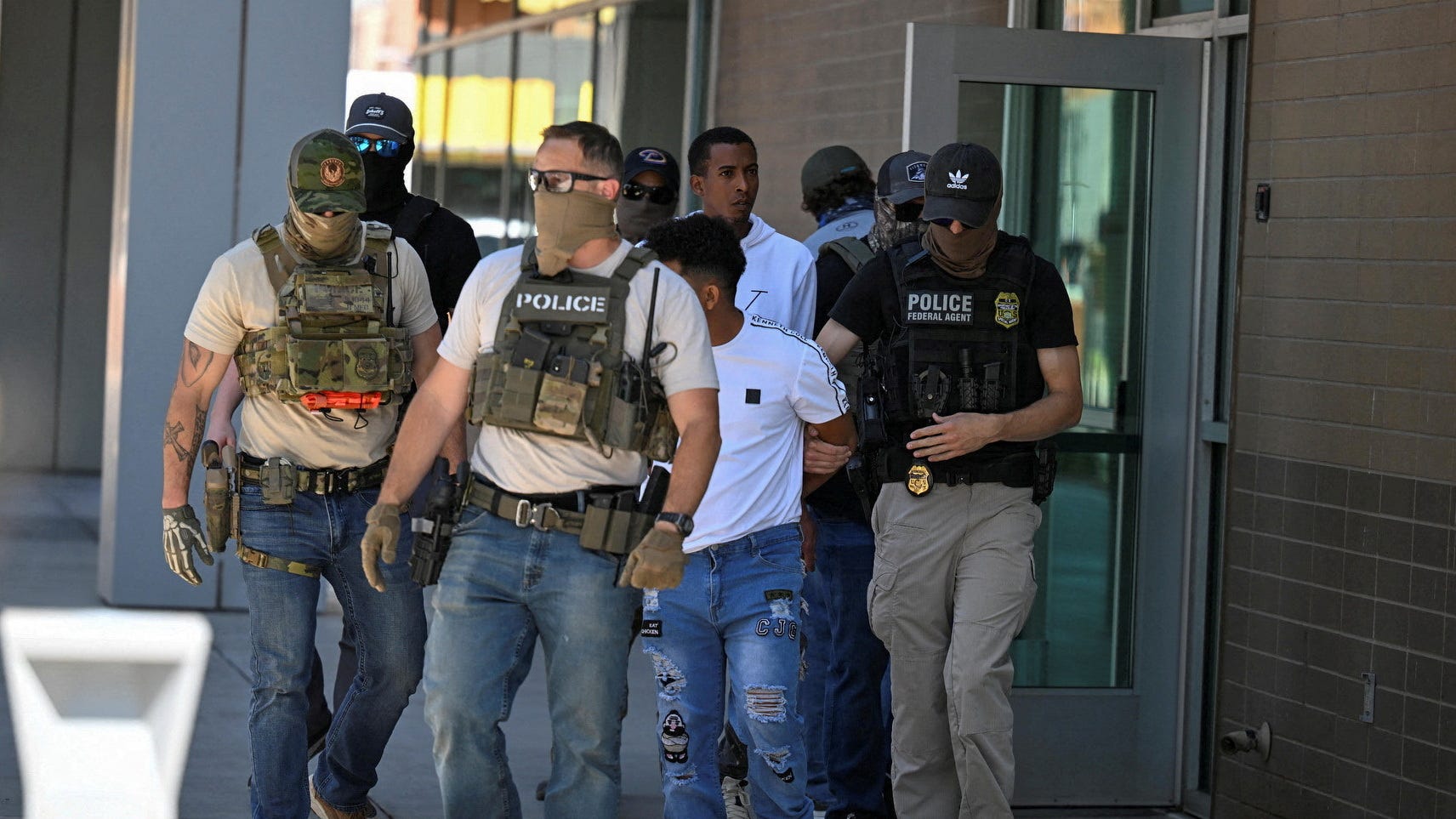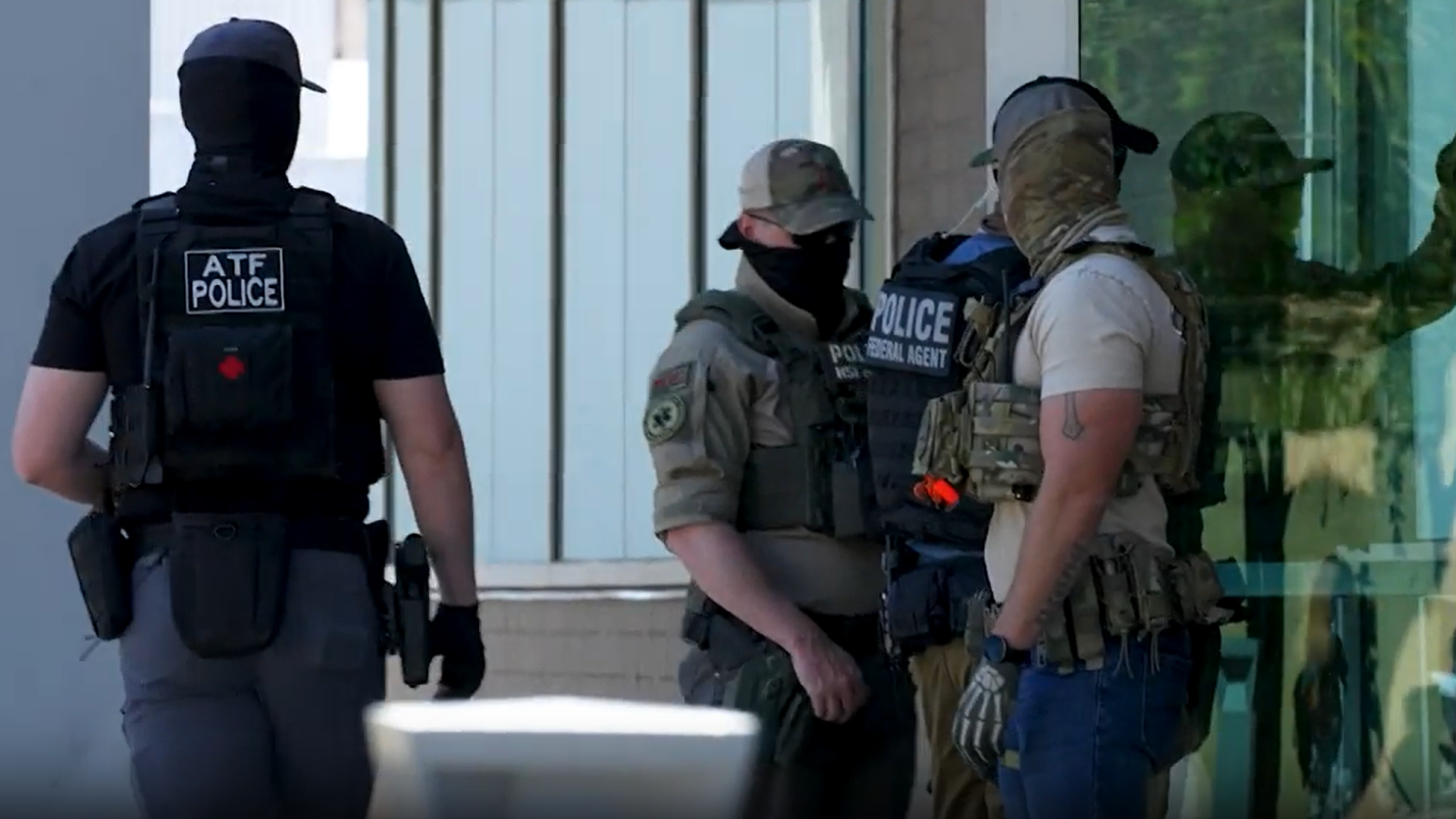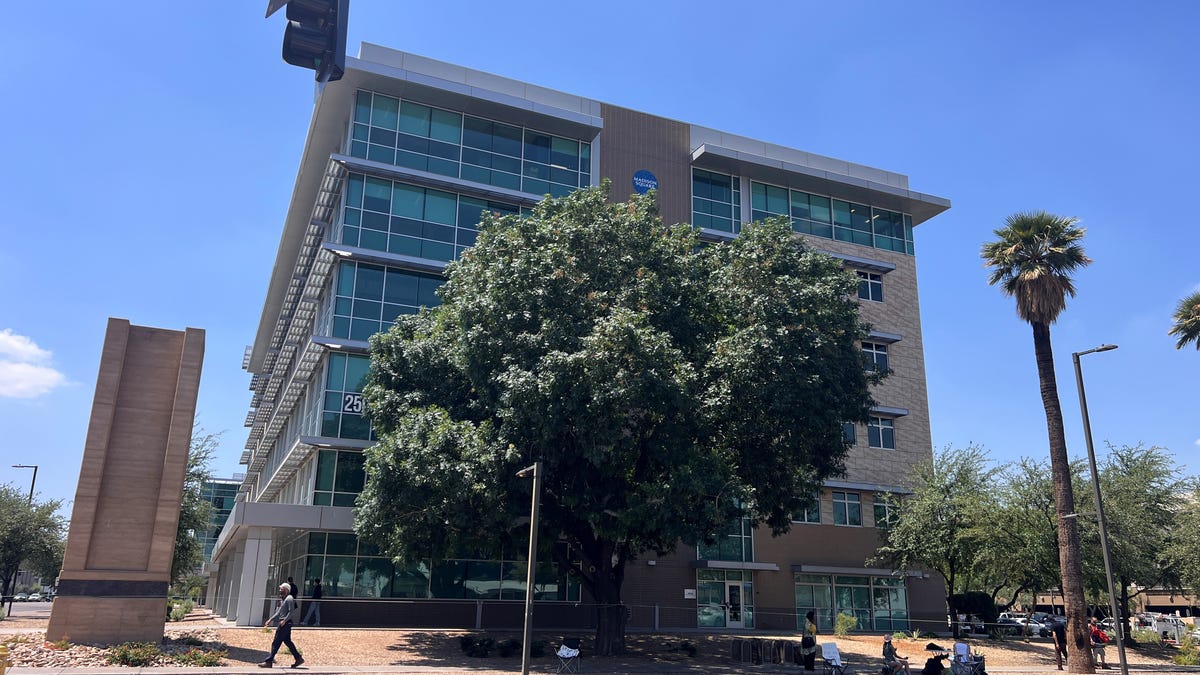
Protesters banned outside Phoenix immigration court after ICE arrests
‘No trespassing’ signs were outside Phoenix immigration court after activists, protesters and reporters captured ICE making arrests outside court.
Immigration activists were barred from handing out “know your rights” cards for two days in a row by a private security firm that protects a building that is being leased for immigration court.
The private security firm followed through on its Aug. 20 morning threat and on Aug. 21 called the Phoenix Police Department on the group of activists for violating the privately owned building’s “No Handbills” policy, said Beth Strano, an activist with Borderlands Resource Initiative.
After a discussion with Strano, Phoenix Police Department upheld the activist’s right to pass out “know your rights” cards, provided they remained “inside.”
The incident reignites questions about the public’s right to assemble and advocate at the Phoenix Immigration Court. The questions have revealed a legal gray area because the government courtroom is leased from a private building and landowner, and First Amendment protections usually don’t extend to private property.
Donna Rossi, Phoenix police communications director, told The Arizona Republic on Aug. 21 that police were not going to cite anyone on the building’s third floor, where the courtroom is.
“If they’re on the third floor, it’s part of the court. They rent out that whole floor, that’s theirs. It’s public, they can be there,” Rossi said.
‘No trespassing. No handbills.’
During the ICE arrests in May, a group of activists started volunteering at the downtown Phoenix courthouse to observe the immigration proceedings and to hand out small, red cards that inform people of their rights, Strano said.
The group of activists went to the third floor where the courtrooms are located, waited in line with people awaiting their immigration hearings and handed out “know your rights” cards before every morning and afternoon courtroom session, Strano said.
Aug. 21 was the first time since May that the private security firm had barred the activists from passing “know your rights cards,” Strano said.
The private security firm posted a laminated sign made of white printer paper at the front entrance of the building and in the hallway leading to the entrance of the courthouse. In bolded, red capitalized letters, the sign said “PRIVATE PROPERTY. NO TRESPASSING. NO HANDBILLS,” Strano said.
When The Arizona Republic came to observe the volunteers on Wednesday afternoon, the private security firm did not keep the activists from handing out the “know your rights cards.”
Thursday morning, the activists went about their routine of handing out the cards until an unnamed female security guard followed through on her threat and called the Phoenix Police Department, Strano said.
Two uniformed Phoenix Police Department officers and Detective Mike Hillman were the first officers to arrive.
Strano handed Hillman an ACLU letter dated June 25 that demanded that the building manager stop using trespassing and loitering orders against people engaged in First Amendment-protected activity at the building.
Three more plainclothes officers arrived later, and they spoke privately with the officers already at the scene.
The security guard who called the police on Strano was in her golf cart 100 feet away from Strano and Phoenix police officials.
The officers spoke with the security guard in private after they allowed Strano and the activists to continue with their work.
What is a ‘know your rights’ card?
The small red cards Strano and the activists handed out to people entering and exiting the courtroom have a side that informs immigrants what to do if they encounter an “immigration agent” and a side that informs authorities they do not wish to speak to them.
The cards Strano and other activists handed out informs people of their rights in Spanish, but the cards are available in 41 other languages, according to the Immigrant Legal Resource Center.
The Spanish side of the card tells people not to open the door, not to answer questions, not to sign anything, and to show the card if they are approached by “immigration agents.”
The opposite side of the card directly addresses law enforcement. The card informs law enforcement that the person holding the card does not wish to speak based on their Fifth Amendment rights, nor do they give authorities permission to enter their home based on their Fourth Amendment rights.

ICE continues arrests outside Phoenix immigration court
A Department of Homeland Security attorney told an immigration judge simply “circumstances have changed” in how prosecutors were handling cases.
Legal rights at immigration court are foggy
Activists’ legal rights at the Phoenix Immigration Court are foggy.
The First Amendment protects the public’s right to protest and peacefully assemble, but those rights don’t extend to private facilities.
The mixed nature of immigration court being housed in a building the government doesn’t own brings complications.
Attorneys at the American Civil Liberties Union of Arizona say they believe the building, Madison Square Phoenix, is a “state actor,” because it’s pervasively entwined with the government — Department of Homeland Security and the Executive Office for Immigration Review are both tenants. That would mean First Amendment protections apply at the building.
But it’s also possible different sections of the building provide different protections.
Someone’s rights to be in the plaza versus the lobby or the third floor all vary depending on whether the space is considered “a traditional public forum,” Gregg Leslie, executive director of Arizona State University’s First Amendment Clinic, told The Arizona Republic in June. That means an area traditionally open to political speech and debate.
Rossi’s update provided to The Republic on Aug. 21 that police wouldn’t cite anyone on the third floor provides clarity and could help shield some activists. But the police’s practice could change if the issue were litigated and a judge interpreted differently.
Another challenge to the public’s right to assemble or advocate is the fact that First Amendment protections don’t technically apply at immigration court. A typical federal court is considered an Article III court, meaning it was established under Article III of the U.S. Constitution and is thus subject to the First Amendment. Immigration court, by contrast, was established through law and is administrative.
ACLU AZ sent a letter to the building manager in June 2025 demanding they stop trespassing members of the public and threatening to sue. John Mitchell, with the ACLU, said the organization was still in its fact-finding phase and looking into whether any of the building’s government tenants OK’d the “No handbills” sign.
The leasing company, Transwestern Real Estate Services, did not respond to questions from The Republic.
Have any news tips or story ideas about immigration and the U.S.-Mexico border in Arizona? Reach the reporter at david.ulloa@gannett.com. Follow him on X, formerly Twitter, @davidulloa_ii.
Taylor Seely is a First Amendment Reporting Fellow at The Arizona Republic / azcentral.com. Do you have a story about the government infringing on your First Amendment rights? Reach her at tseely@arizonarepublic.com or by phone at 480-476-6116.
Seely’s role is funded through a collaboration between the Freedom Forum and Journalism Funding Partners. Funders do not provide editorial input.
